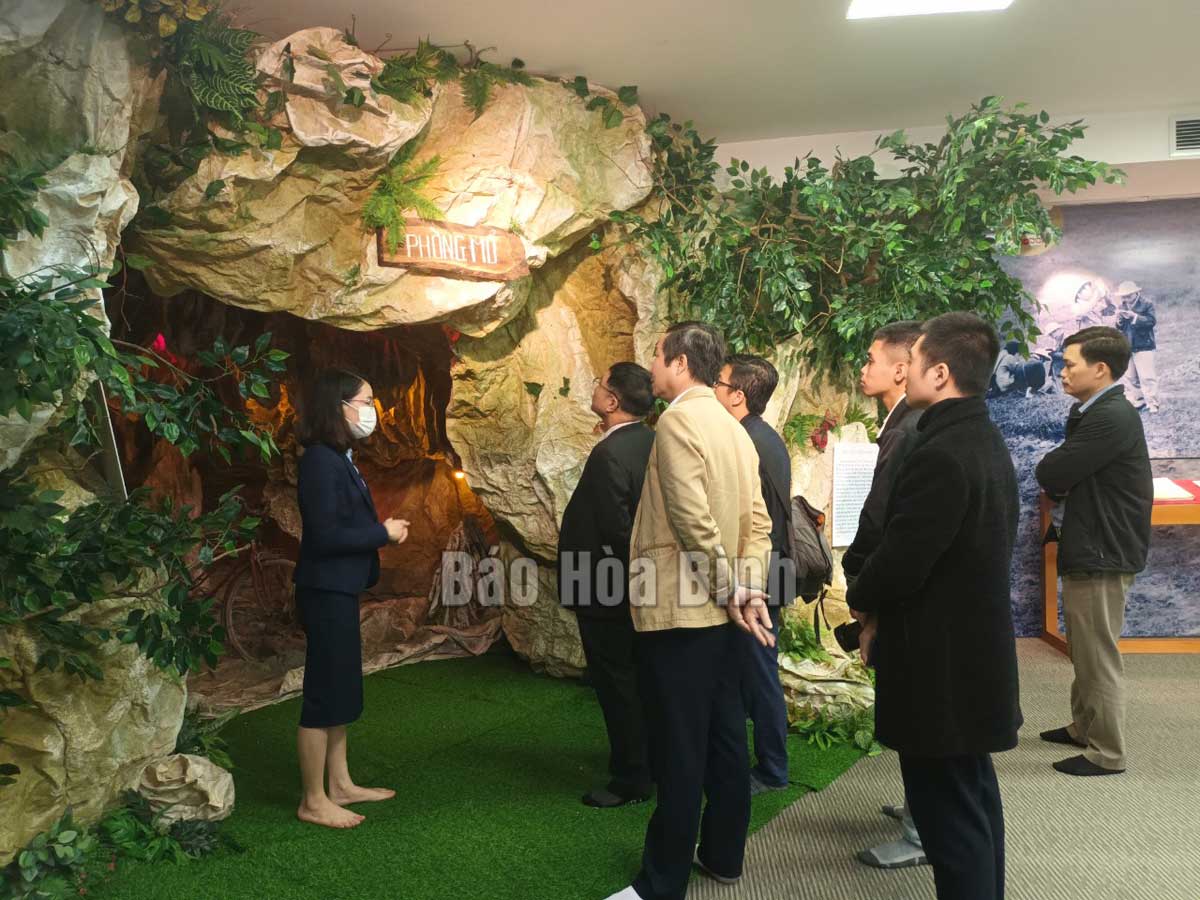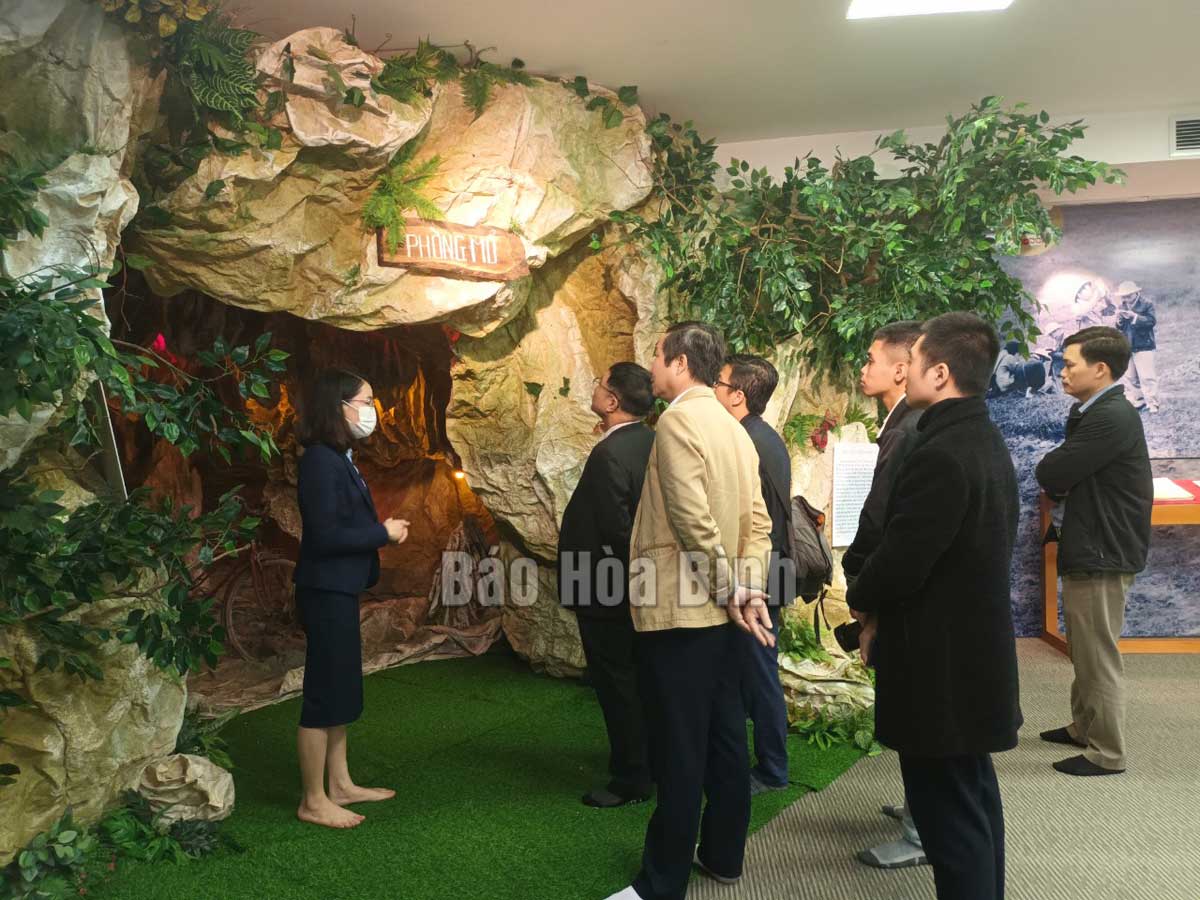
(HBO) - Spreading over 30 hectares, with charming scenery and many auxiliary works serving conferences, scientific research and entertainment, the Heritage Park of Vietnamese scientists in Tieng hamlet, Bac Phong commune, Cao Phong district, has been known not only as an attractive tourist destination but also a place to light up the passion for scientific research and the spirit of overcoming difficulties of talents in many fields.
Photo: Visitors visit the exhibition area
displaying images and documents at the Heritage Park of Vietnamese Scientists
in Bac Phong commune, Cao Phong district.
Exhibits and research products of 100 scientists are displayed at the museum.
Each object carries its own message, reflecting a part of the scientist’s past
as well as the historical context of each period.
At a stall showcasing exhibits of Vietnamese education before and after the
August Revolution 1945, there are special objects about a generation of
Vietnamese students during the French colonial period, such as a learning
report of "Thanh Nam prodigy" Pham Dong Dien who later
became Professor Pham Dong Dien, Rector of Hanoi University of Science
and Technology-one of the figures assigned by the Ministry of
National Defence to research weapons serving the resistance war against the
French.
Exhibits, pictures and research works of outstanding scientists in the field of
medicine are also displayed at the exhibition. They include a scalpel and a
photo of student Pham Van Phuc, later Assoc. Prof. Dr. Pham Van Phuc who
performed the surgery in which the patient was soldier La Van Cau, a hero of
the People's Armed Forces during the 1950 Border Campaign.
Visitors can also learn about the research work of four persons who are
considered as "four pillars" of Vietnamese medicine in the resistance
war. They are Professor Ton That Tung (a street in Hanoi is named after him);
Prof. Dang Van Chung, Prof. Chu Van Tuong and Prof. Dinh Van Thang.
A draft of the book "small and large surgery on the liver” published by
Paris-based Masson Publishing House is displayed at a solemn site at the
park. The draft consists of 216 pages, handwritten and typed by Prof. Ton
That Tung in French. The book has been praised by the world’s surgeons.
Professor Tung's method of liver resection is also known as "Ton That Tung
method".
Not only displaying and introducing achievements in medicine, mathematics,
biology and geology, the park also creates a highlight with special objects of
the subsidy period. Models of old apartments with things of the period such as
bicycles, and coupons to buy goods and rice give visitors a better
understanding of the past of the country.
After spending a full day visiting and experiencing the heritage park, Nguyen
Minh Duc, a tourist from Hanoi said that given its geographical location and
archived research works, thepark is really a suitable place for relaxing
as well as for organising events, seminarsand organizing life skills
education classes for the young generation./.
With an increasingly vibrant and widespread emulation movement aimed at building cultured residential areas and cultured families, Yen Thuy District has been making steady progress toward improving both the material and spiritual well-being of its people, while fostering a civilized, prosperous, beautiful, and progressive community.
Once lacking recreational spaces and community facilities, Residential Group 2 in Quynh Lam Ward (Hoa Binh City) has recently received attention for the construction of a new, spacious, and fully equipped cultural house. The project followed the model of state support combined with public contributions in both labor and funding.
The "All people unite to build cultural life" movement, which has been effectively integrated with Kim Boi district’s socio-economic development goals, is fostering a lively spirit of emulation across local residential areas, hamlets, villages, public agencies, and enterprises. In addition, through the initiative, traditional cultural values are being preserved and promoted, while community solidarity and mutual support in poverty reduction and economic development are being strengthened.
A working delegation of the Hoa Binh provincial People’s Committee led by its Permanent Vice Chairman Nguyen Van Toan on June 11 inspected the progress of a project to build the Mo Muong Cultural Heritage Conservation Space linked to tourism services in Hop Phong commune, Cao Phong district.
Born and growing in the heroic land of Muong Dong, Dinh Thi Kieu Dung, a resident in Bo town of Kim Boi district, in her childhood was nurtured by the sweet lullabies of her grandmother and mother. These melodies deeply imprinted on her soul, becoming an inseparable part of her love for her ethnic group's culture. For over 20 years, this love for her hometown has driven Dung to research, collect, and pass down the cultural values of the Muong people to future generations.
In the final days of May, the Ethnic Art Troupe of Hoa Binh Province organized performances to serve the people in remote, mountainous, and particularly disadvantaged areas within the province. These were not just ordinary artistic shows, but they were the meaningful journeys aimed at spreading cultural values, enhancing the spiritual life of the people and contributing to the preservation of ethnic minority cultural identities.



